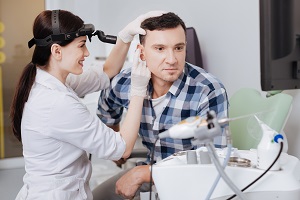
Consequences of Untreated Hearing Loss
Reviewed by Dr. Porter on October 24, 2018
Hearing aids have been in the news a lot lately.
In August of 2022, the Food and Drug Administration announced new regulations that make hearing aids an over-the-counter product.
In theory, you don’t need a prescription to get a hearing aid anymore, at least if your impairment is limited to mild to moderate hearing loss. Show up at an electronics store, plunk down your credit card, and walk out with a hearing aid.
There are some legitimate experts in hearing health who are happy about this.
“It actually finally happened after all these years,” said Dr. Franklin Lin to the New York Times. Dr. Lin serves as the director of the Johns Hopkins Cochlear Center for Hearing and Public Health. He has been a vocal, longtime supporter of the new regulations, which Congress authorized in 2017.
“Over 90 percent of adults with hearing loss have needs that can be served by over-the-counter hearing aids,” Dr. Lin said. The audiology expert points out that companies now have a glide path for offering hearing aids for hundreds of dollars instead of thousands of dollars. And he’s right.
But treating hearing loss isn’t just about turning up the volume. You may need help with certain frequencies, and not with others. Two-minute online tests can’t diagnose this for you. And you may need to get pointed in the right direction for help dealing with the long-term consequences of hearing loss that have taken hold in your life before you get your hearing corrected. That is, if an over-the-counter hearing aid is actually what you need.
Just how bad can the effects of untreated hearing loss get?
The honest answer is it depends.
Older people who let their hearing loss go untreated experience greater social isolation and greater isolation.
You might be thinking, “Wait, aren’t social isolation and loneliness the same thing?”
Not quite. Social isolation is an objective change in the number of social connections someone has. People who lose hearing acuity gradually connect with fewer and fewer people.
Socially isolated people can experience loneliness. Loneliness is a kind of disconnect between the number of social connections you want and the number of social connections you have. Loneliness can be social, not having enough friends, or emotional, losing your connection with your spouse or significant other. Of course, there are reasons you can feel socially isolated or lonely in addition to hearing loss. But the symptoms of loneliness primarily caused by hearing loss get diagnosed as a wide array of serious diseases.
What kinds of symptoms show up with untreated hearing loss?
People who lose their hearing lose their friends. They don’t interact with people as much. They may become distant from their life partners and their families.
The emotional pain of isolation activates a panoply of disease processes. People with untreated hearing loss develop depression. They feel tired all the time. They are hit extra hard by the gloom and fog of winter weather. They give up on life goals, hobbies, and friendships. They slip into a spiral of depression and decisions that make the situation worse.
People who have hearing loss develop problems with anger and impulse control. They startle more easily. They don’t sleep as well. They don’t get the intellectual inputs they need to fend off Alzheimer’s disease.
Depressed people don’t manage their diabetes well, and out of control diabetes causes depressing symptoms. People who have untreated hearing loss fall more often. They get into more car crashes. Their immune systems are weakened by imbalances in white blood cells that generate too much inflammation. Their cortisol (stress hormone) levels go up, so they have trouble keeping weight off. They develop high blood pressure and are at greater risk of heart attacks and strokes.
We aren’t just ticking off a long list of diseases that are associated with untreated hearing loss. Every single one of these problems is confirmed in the medical literature. Not getting your hearing problems treated professionally can result in a loss of quality of life and a shorter life.
Unfortunately, there is one more issue.
If you don’t get hearing loss treated, you won’t respond as well to hearing aids later, even if you get the hearing aid you actually need.
When your eyes get older, they usually still function basically as they always did, except the lenses don’t bend light the way they used to. Get a pair of glasses, or a pair of contacts, and your vision may be restored.
When your ears get older, the nerves that conduct electrical impulses to your brain shut down if they are not stimulated enough. Cells in your inner ear die off and don’t regenerate. Even if you get a hearing aid at this stage, your hearing won’t be what it could be if you just got the right hearing aid in time.
Before we go, we need to let you know about two financial issues. If you are on a Medicare Advantage plan, you still wind up paying about 80 percent of hearing treatment. You can actually save money by seeing a professional hearing specialist first.
We also need to let you know something about those new, “cheaper” over the counter hearing aids. They will cost $300 to $3,000, Bose has a new self-fitted hearing aid it will offer for $900, enough that most seniors will think twice about buying it. But if you don’t get a professional hearing exam by an audiologist, you won’t know whether it will work for you. You could wind up buying several hearing aids at $300 to $3000 each. And you may still have unmet health needs that an audiologist can help you with.
Early stage hearing loss might not seem like a big deal. You might not even recognize that you’re having difficulty hearing until the condition progresses. But, according to a new study by the National Council on Aging (NCOA), untreated hearing loss can have serious social and emotional consequences – especially for aging adults.
The NCOA surveyed 2,500 hearing impaired adults age 50+, and the results are shocking – those with untreated hearing loss are more likely to report anxiety, paranoia and depression. They were also less likely to engage in social activities than hearing aid wearers.
Contact Us
Hearing aids aren’t just for making sound louder. Modern hearing aids can help you focus on the conversation, music, or performance you want to hear, blocking out background noise. They can give you a distortion-free connection to your phone or to a microphone for a play, a movie, or a speaker. They eliminate feedback from your phone.
See Harbor Audiology for a professional fitting of a hearing aid that gives you exactly the hearing correction you need! Harbor Audiology has convenient offices in Tacoma, Gig Harbor, Silverdale, Sequim, Federal Way, and Port Angeles. Request your appointment online or call us at 253-999-9649 or text us at 253-338-5181 to schedule your appointment today!
NCOA also linked untreated hearing loss to:
- Irritability, negativity and anger
- Social rejection and loneliness
- Fatigue, tension, stress and depression
- Reduced alertness and increased risk to personal safety
- Impaired memory and ability to learn new tasks
- Avoidance or withdrawal from social situations
- Reduced job performance and earning power
- Diminished psychological and overall health
In contrast, the NCOA also found that hearing aid wearers report better:
- Self-perception
- Relationships at home
- Relationships at work
- Relationships with children and grandchildren
- Mental health
- Sense of safety
- Social life
- Self-confidence
The families of hearing aid wearers weighed in on the survey, too. In nearly every dimension measured, the families not only noted improvements, they were more likely to identify and report positive changes.
Prevalence of Hearing Loss Among Seniors
Hearing loss affects more than 19 million Americans aged 45 and older, making it one of the most widespread chronic conditions in the U.S. It can impact a person’s entire life, from the office to the bedroom, yet only 40% of hearing impaired seniors wear hearing devices.
Why? Sixty-percent feel their hearing isn’t that bad and/or believe they can get along without them. Over half said hearing aids would make them feel old or they’d feel too embarrassed to wear them.
The good news is that today’s hearing aids comes in a variety of sizes and styles, some of which are completely invisible! Harbor Audiology provides expert hearing health care and consultation to people of all ages in the Gig Harbor and Tacoma, Washington areas.
Together, we can fight the stigma of hearing loss and turn up the volume on your life! Contact us to learn more or to schedule an appointment.
Categorised in: Hearing Loss






